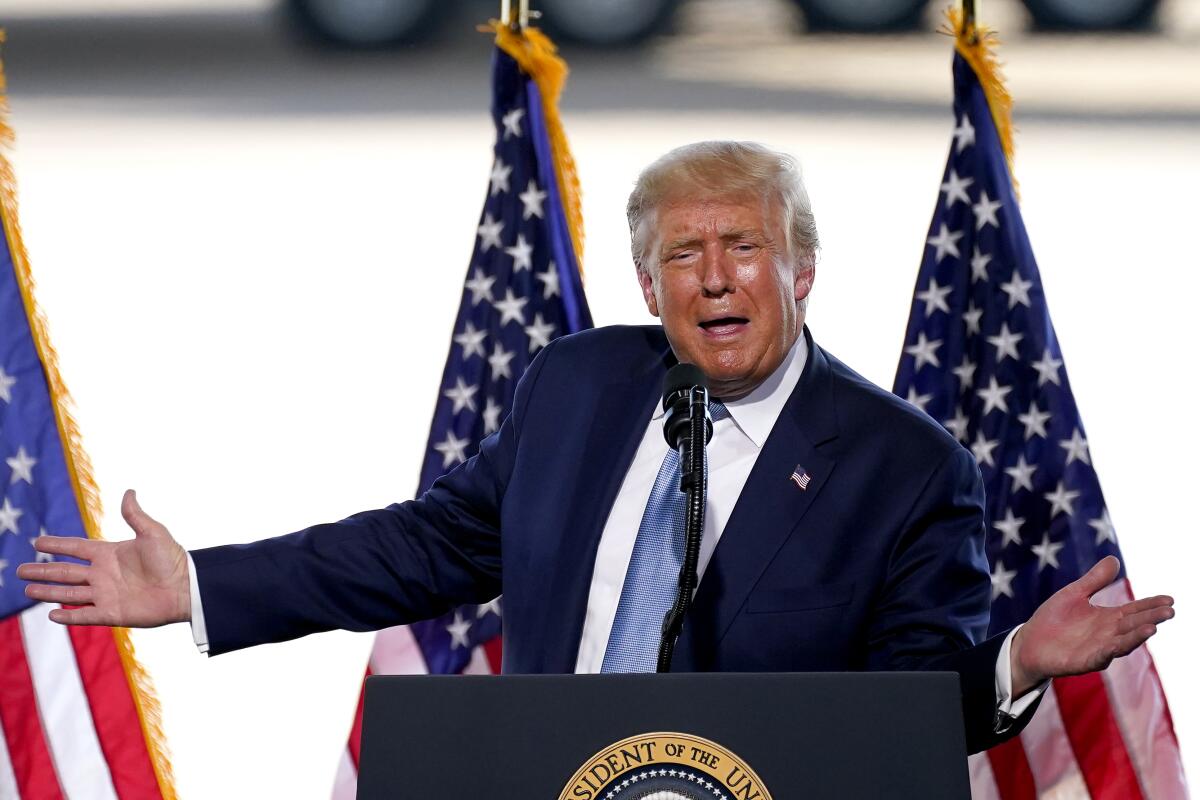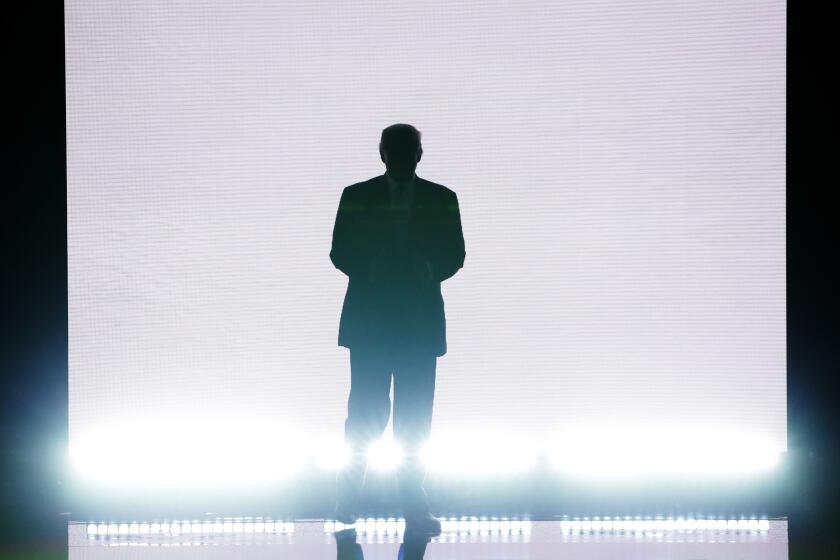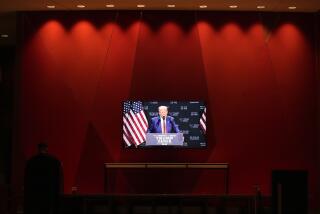Trump needs to pivot at the Republican convention. He probably won’t

- Share via
WASHINGTON — President Trump heads into his party’s virtual convention Monday facing a daunting challenge: He’s fallen behind Joe Biden in the presidential race, and he hasn’t found a way to catch up.
The coronavirus crisis and its accompanying economic slump have driven the president’s approval rating down to 42%, dangerous territory for an incumbent seeking reelection.
Win or lose in November, President Trump already has a legacy of domestic deregulation and global disruption. But his botched response to a deadly pandemic and a deep recession overshadow the rest.
His response has been to claim falsely that the pandemic is ending — and to charge that Biden is “a puppet of the radical-left movement that seeks to destroy the American way of life.”
That message hasn’t worked. Trump has trailed Biden in every national poll since April, sometimes by 10% or more. The race is closer in the battleground states that will decide the election, so the president still has a shot at winning — but only if he finds a way to shake up the campaign.
Here’s his problem: Trump is fighting the last war. He’s been waging a dystopian crusade like his 2016 campaign, when he was an outsider challenging the party in power.
But there’s a reason most incumbent presidents offer a more hopeful message when they run for reelection; they’re asking voters to sign up for four more years of the same.
Worried Republican strategists argue that Trump should use the convention to change course and focus on measures designed to help the economy recover, including more help for the millions out of work, before voters fill out their absentee ballots.
“Trump needs to paint a happier picture,” John Feehery, a former strategist for Republican congressional leaders, told me. “He needs to offer some optimism. You can’t go all-in on dystopia, especially when you’ve been president for the last four years.”
“His message needs to be more forward-looking on economic growth for the next four years,” agreed Scott Reed, a longtime GOP operative who is chief political strategist for the U.S. Chamber of Commerce. He should emphasize “the positive for a second-term agenda,” Reed said.
Karl Rove, who ran George W. Bush’s presidential campaigns, noted that the last three presidents who won reelection “used their acceptance speeches to convince voters that they had something new to offer.... [Trump’s] weakness so far is he hasn’t laid out an agenda for a second term.”
To be fair, Trump occasionally alights on positive themes, especially when he’s reading lines prepared by his speechwriters.
“In a second term in office, we will create 10 million jobs in the next year,” he said during a visit to Pennsylvania last week. “We will make America greater than it has ever been before.”
But those grace notes are quickly swamped by invective aimed at his opponents.
“There’s only one thing standing between your family and the radical left-wing mob, and that is your vote,” he added in the same speech. “If you want mobs and criminals, you’ve got to vote Democrat.”
He revived one of his favorite themes from 2016, the resentment many of his white working-class supporters feel toward Democratic elites and their causes. He cast himself once again as a law-and-order president holding back an onslaught of urban violence, his dark version of mostly peaceful protests seeking a racial reckoning.
“A lot of people got rich and got powerful at your expense. Now these same liberal hypocrites want to open our borders and let violent mobs rule the streets while they live in walled-off compounds,” he said. “They want to let rioters burn churches while jailing you for praying.”
In other appearances, Trump falsely charged that Biden wants to defund the police, “destroy the suburbs” and outlaw cows. (“They don’t want to have any form of animals,” he said, an unhinged interpretation of Democrats’ call for limits on greenhouse gas emissions.)
There’s no sign yet that he’s ready to change. The only recent alteration in his message has been a new nickname for Biden: “Slow Joe” instead of “Sleepy Joe,” now accompanied by “Phony Kamala.”
A pivot could be hard for Trump to bring off. The optimistic case for four more years is a hard one to argue: Despite what the president says, the coronavirus isn’t under control and the economy isn’t recovering strongly.
And his own temperament gets in the way. Trump always appears happiest when he’s attacking his critics and stoking voters’ fears.
But the story of this election isn’t that Biden is ahead thanks to brilliant campaigning and a deep well of voter support; it’s that Trump has been busy defeating himself.
So if you’re looking for drama at this week’s Republican convention, that’s where it will be. Will this headstrong president admit his predicament and change course? And if he does, can he bring it off?
More to Read
Get the L.A. Times Politics newsletter
Deeply reported insights into legislation, politics and policy from Sacramento, Washington and beyond. In your inbox twice per week.
You may occasionally receive promotional content from the Los Angeles Times.












